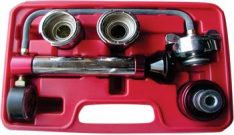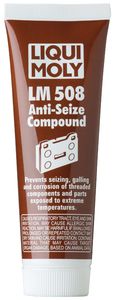Engine Overheating
Engine overheating can be dangerous. If you allow it to continue for too long, your engine can suffer permanent damage.
Browse Recommended Tools & Supplies For This Build
To avoid this, pull over and shut the engine down as soon as possible. It’s also a good idea to open the hood to allow the heat to dissipate more quickly after you’ve pulled over. If there isn’t a place to pull over, you can run your heater to help cool things down until you’re able to properly address the issue. When you run your vehicle’s heater, it acts like an extra radiator and helps cool an overheating engine. This might suck on a hot day, but it will help keep the engine cool, which can get you a little farther down the road.
Also, if you have your AC on, turn it off. The AC causes an increased heat load on the system, and the last thing you need when your engine is overheating is more heat.
DO NOT remove your radiator cap if your vehicle is overheating! The cooling system is under pressure and if you remove the cap, you could get a face full of scalding coolant and steam. Trust me; I’ve seen it happen, and the guy it happened to was called “Lobster Boy” for the rest of his career. If you want to add coolant, add it to the overflow that is not pressurized.
Also, don’t pour cold water into a hot engine; you could damage it. Use room-temperature water, not water from melted ice in your cooler. If you do use the melted ice water, let it sit in the sun for a while to warm up first. If you have a pressurized overflow, i.e., an expansion tank, treat it like it has a radiator cap on it, because that’s exactly what it has. Vehicles with expansion tanks have a pressurized overflow; if you remove the cap when it’s overheating, you get the same result as you would removing a radiator cap. Usually, the easiest way to spot the difference is to look at the cap on the overflow itself. If it has warnings on it, heed them, as the coolant is likely under pressure and can cause burns if it comes rushing out onto your skin after you remove the cap.
Here is a video going over the specifics.
Expansion tank

If it’s just a plastic cap with no writing, then you should be OK, as an overflow tank is not under pressure and is the best place to add coolant if you’re overheating. Once you add the coolant, you’ll have to wait for a few minutes for the coolant to be drawn into the radiator—but waiting is better than risking injury by removing a radiator cap from a hot engine compartment.
Basic Overflow Tank

In a pinch, you can fill your radiator with tap water. Usually, you want to use distilled water in your cooling system; tap water has impurities that can cause deposits and buildup in the cooling system if the water is left in it too long. But, if you’re losing coolant at a rapid rate, use whatever you can, because no coolant at all is much worse than putting something in there to help cool things down.
As stated earlier, an overheat can severely damage an engine, so you want to avoid it at all costs. Use whatever coolant you can till you can get to a place where you can properly address the issue, or call a tow truck. The important thing is to address an overheat as soon as possible; if you keep driving, your engine will not be long for this world.
Tools/Supplies For This Build:
Tests automotive pressurized cooling systems up to 30 PSI Kit includes: Pump with gauge 12” hose and cap adapter to...
Copper paste Used especially for high temperature applications Used on screw connections and parting faces exposed to high temperatures, high...
Select Your Issue
- Engine Overheating
- Solving Cooling System Problems
- Checking for Leaks
- Thermostats
- Radiator Caps
- Head Gasket Issues or Better Stated, Combustion Leaks Into the Cooling System
- Chocolate Milk for Oil
- Loss of Cooling System Efficiency
- Fan Clutches
- Fan Shrouds
- Radiator Restrictions
- Water Pump Failure
- Radiator Obstructions
- Other Causes of Overheating
- Stop Leak Products
- What to Do When Your Engine Overheats Summary
 Our Address
Our Address 






4 thoughts on “What to Do When Your Engine Overheats”
Dion Wolfinbarger
August 27, 2021 at 2:12 pm
My 2004 Hyundai Accent Sometimes overheats but then all of a sudden, cools itself off. Is my thermostat going bad?
Jabba
April 16, 2022 at 12:04 am
Check coolant level and burn out trapped air
Just Price
March 4, 2020 at 3:44 pm
I have a vehicle that’s overheating it doesn’t take long for it to overheat but what’s strange as it doesn’t seem to overheat as fast when I remove the coolant reservoir cap my is a 2003 Oldsmobile Alero 2.2l 4cyl
Wyatt Cerri
February 15, 2021 at 7:17 am
Did it end up being a leak or air trapped near that part of the cooling system?